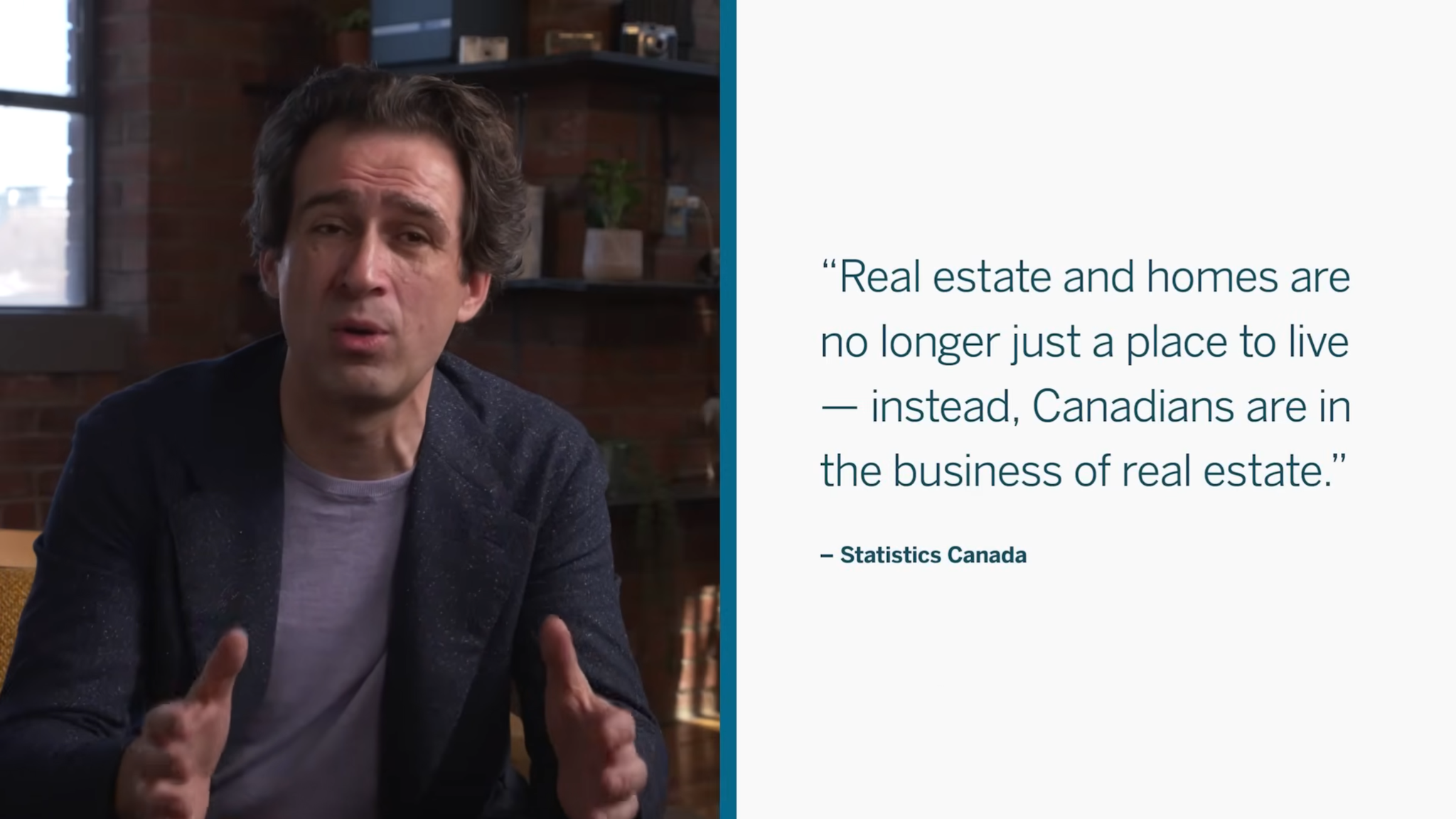The Great Selloff by John Pasalis
The recent housing report by Realosophy President John Pasalis is a masterclass on speaking the truth, when financial & political forces keep most housing 'experts' quiet.
"Canada has built an economy where the best way to get rich isn’t to invent, create, or build anything—it’s to own houses and wait for prices to rise."
Here are some truths every Canadian should know:
More supply alone won't make homes affordable, when investor demand grows faster than we build. Anyone who says it will is promising disappointment.
Expensive housing is a deliberate policy choice—Canada actively encourages homes as investments, concentrating stock into those already with wealth
Young families' wages have no shot against megacorp capital, who use sophisticated algos to scoop up 10,000s homes and extract max rent
Unlike previous generations, prices are no longer anchored to incomes, but global investment demand and how much banks are willing to lend. Unlimited credit seeking tax-sheltered returns means unlimited prices.
But investors aren't just megacorps, they're mom and pops that leverage against existing properties to buy even more, outbidding families in the search for tax-sheltered leveraged gains
Banks are pouring fuel on the fire: they have more incentive to lend aggressively for mortgages than to businesses looking to grow
We can and should change incentives to make housing a less lucrative investment, bringing down prices and prioritizing real economic activity over unproductive extraction.
Quotes from the report
Read on for choice quotes from Pasalis' report "The Great Sell Off"
"The evidence is increasingly clear: affordability cannot be restored through supply-side policies alone. Canada’s housing crisis illustrates the risks of relying too heavily on one side of the equation for too long."
"the flow of capital into real estate faces few barriers, while increasing supply comes with numerous constraints: labour shortages, infrastructure requirements, and environmental limits. The idea that we can build homes faster than global capital can buy them is wishful thinking."
"though Toronto has been building more supply, when demand from investors is growing faster than our housing stock, more of our housing stock ends up being owned by investors making them unavailable to be bought by end-users including first-time home buyers."
"this belief that we can build so many homes so quickly that we’ll reach a housing market in which homes and the land they sit on have no long-term investment value is a theoretical academic utopia — one not borne out by the data."
"Ownership is concentrating, not through government intervention, but through the financialization of housing. And if this trend continues, we risk moving toward a system that increasingly resembles feudalism—not socialism."
"This is not the loss of freedom through government overreach. It is the quiet erosion of freedom through market dynamics—through policies that have prioritized investment returns over housing security, and commodification over community."
"But this isn’t just a housing crisis—it’s an economic one. Canada has built an economy where immense amounts of capital are being parked in residential real estate, not to create new value, but to extract it. Instead of fueling innovation, productivity, and job growth, investment is being funnelled into assets that generate private wealth without producing broader economic benefits."
"To borrow a term from economist John Maynard Keynes, these are the ‘functionless investors’ in our society today. They are functionless because they are not investors who create and add value to our society or communities by creating new housing. They earn profits by hoarding single-family homes already in short supply in Canada and renting them out to the families who have been shut out of owning that home as their principal long-term residence."
"Unlike end-users, who are typically constrained by their household income when purchasing a home, investors often have access to significantly more capital. This gives them far greater buying power, allowing them to outbid regular buyers and purchase multiple properties."
"The federal government's decision to prioritize housing as a financial investment rather than as affordable shelter has concentrated more of Canada’s housing stock in the hands of a wealthy few, deepening wealth inequality across the country."
"In short, Canadian banks have a greater incentive to lend more aggressively to anyone who wants to buy a home and far less incentive to lend money to businesses that are trying to improve their productivity.
"The federal government’s dramatic shift on housing and immigration policy came only after the public stopped believing the experts—trust in their explanations gave way to the reality many Canadians were living: being priced out of the housing market."
"Any gains in housing value should benefit the many, not the few—flowing into the hands of Canadian households to support their long-term well-being, not simply inflating the wealth of investors."
"The best way to fight the investor's market dominance is to make single-family homes less lucrative."
"For some reason, in the US we’ve decided the money money makes should be taxed lower than the money sweat makes.
A slew of incentives to own vs. work amount to a transfer of wealth from the young to the old, and from the poor to the rich.”— @profgalloway
"These taxes are not about punishing success—they’re about realigning incentives. Just as taxes on cigarettes or alcohol are used to discourage harmful behaviours, taxing housing speculation is a tool to address an increasingly damaging economic trend."
"In fact, the current trajectory—where housing ownership consolidates among a small number of corporate and wealthy investors—bears more resemblance to centralized control than many would like to admit. It’s not state socialism, but private-sector feudalism."
"If we want a resilient economy—and a housing system that works for the next generation—we need to rethink what we reward. If we want housing to be affordable for the next generation, it must become a less attractive investment for this one. There are no shortcuts—only choices."
Read the full report here , share our thread on X, and watch the companion video below.


